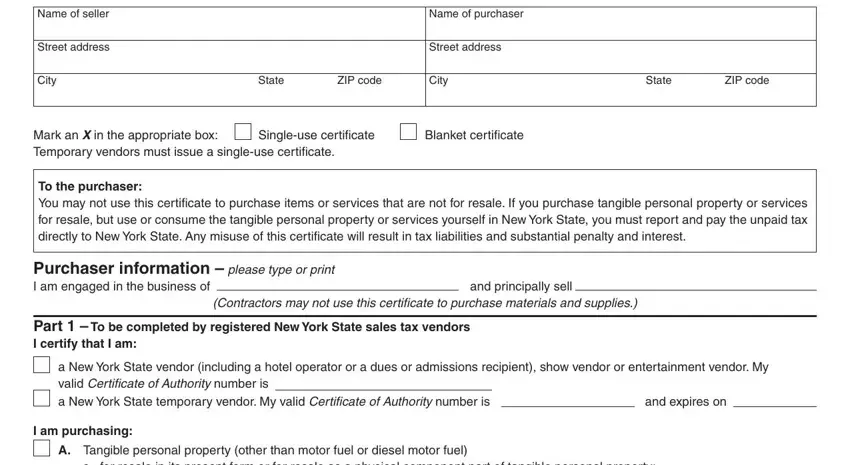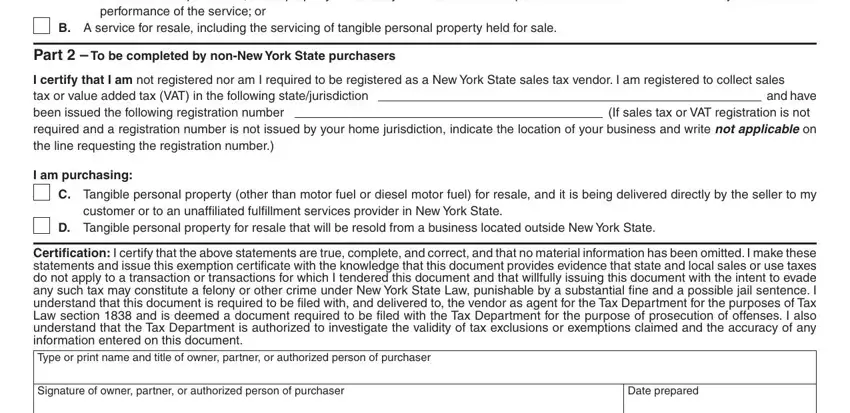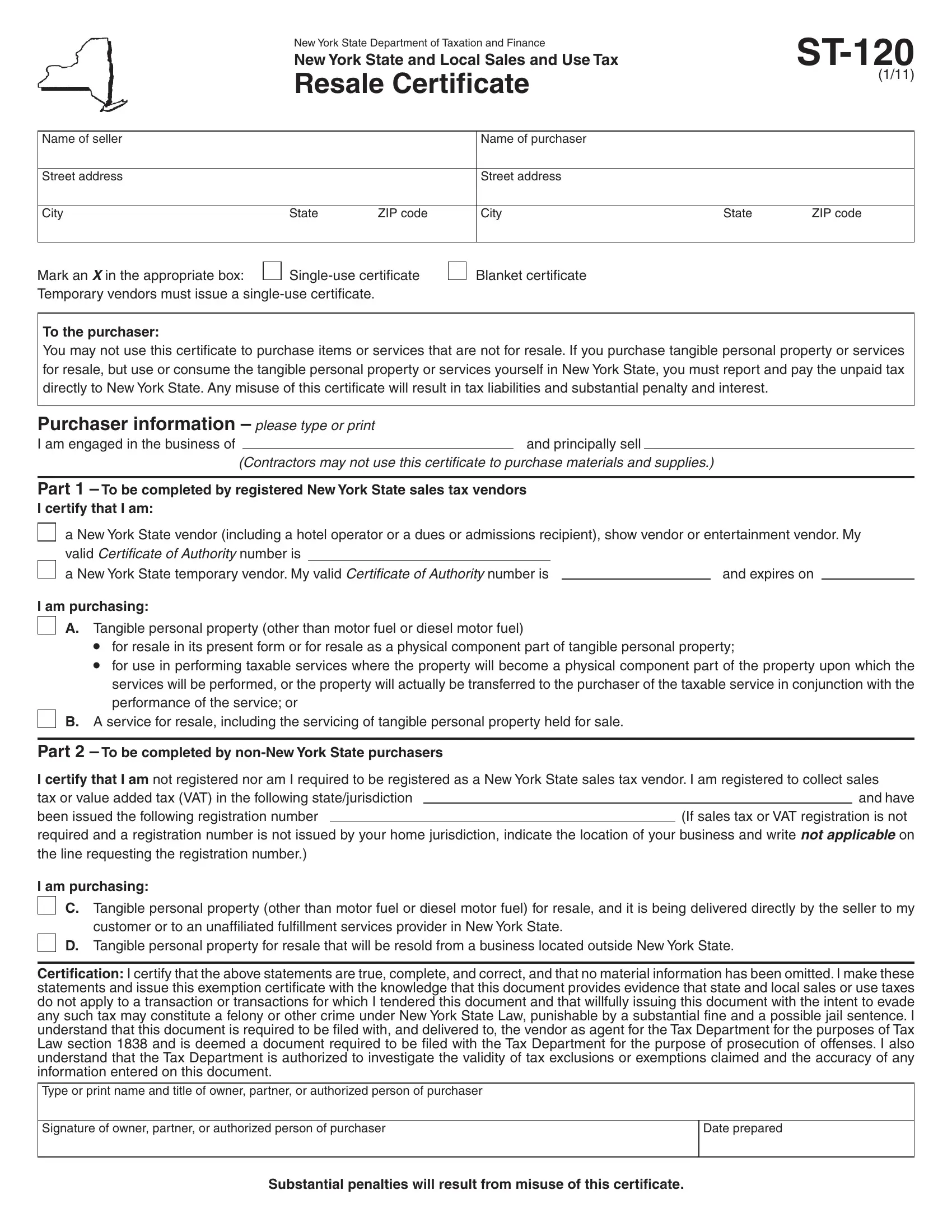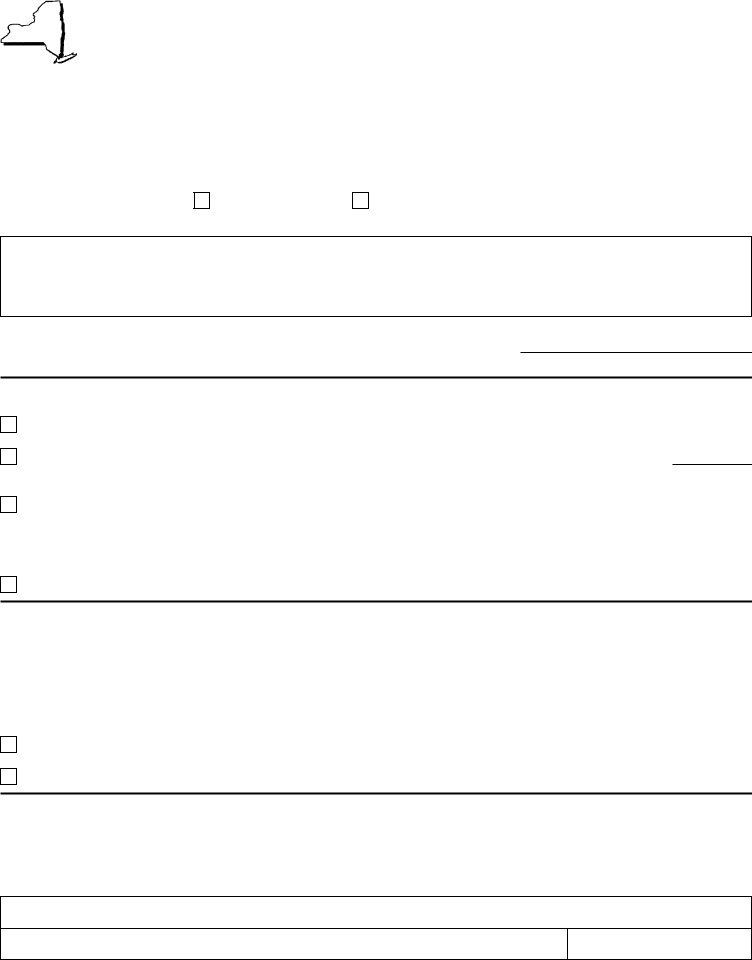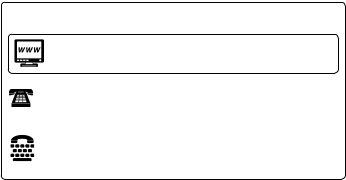Form ST-120, Resale Certificate, is a sales tax exemption certificate.
This certificate is only for use by a purchaser who:
A– is registered as a New York State sales tax vendor and has a valid Certificate of Authority issued by the Tax Department and is making purchases of tangible personal property (other than motor fuel or diesel motor fuel) or services that will be resold or transferred to the purchaser’s customers, or
B– is not required to be registered with the New York State Tax Department;
–is registered with another state, the District of Columbia, a province of Canada, or other country, or is located in a state, province, or country which does not require sellers to register for sales tax or VAT purposes; and
–is purchasing items for resale that will be either:
1)delivered by the seller to the purchaser’s customer or to an unaffiliated fulfillment service provider located in New York State, or
2)delivered to the purchaser in New York State, but resold from a business located outside the state.
Note: For purposes of 1) above, delivery by the seller includes delivery in the seller’s own vehicle or by common carrier, regardless of who arranges for the transportation.
Non-New York State purchasers: registration requirements
If, among other things, a purchaser has any place of business or salespeople in New York State, or owns or leases tangible personal property in the State, the purchaser is required to be registered for New York State sales tax.
A business must register (unless the business can rebut the statutory presumption as described in TSB-M-08(3.1)S, Additional Information on How Sellers May Rebut the New Presumption Applicable to
the Definition of Sales Tax Vendor as Described in TSB-M-08(3)S ) for New York State sales tax if the business enters into agreements with residents of New York State under which the residents receive consideration for referring potential customers to the business by links on a Web site or otherwise, and the value
of the sales in New York State made by the business through those agreements totals more than $10,000 in the preceding
four sales tax quarters. See TSB-M-08(3)S, New Presumption Applicable to Definition of Sales Tax Vendor, and TSB-M-08(3.1)S.
Also see TSB-M-09(3)S, Definition of a Sales Tax Vendor is Expanded to Include Out-of-State Sellers with Related Businesses in New
York State, for information on sales tax registration requirements for out-of-state businesses with New York affiliates.
A purchaser who is not otherwise required to be registered for New York State sales tax may purchase fulfillment services from an unaffiliated New York fulfillment service provider and have its tangible personal property located on the premises of the provider without being required to be registered for sales tax in New York State.
If you need help determining if you are required to register because you engage in activity in New York State, contact the department (see Need help? ).
If you meet the registration requirements and engage in business activities in New York State without possessing a valid Certificate of Authority, you will be subject to penalty of up to $500 for the first day on which you make a sale or purchase, and up to $200 for each additional day, up to a maximum of $10,000.
To the Purchaser
Enter all the information requested on the front of this form.
You may mark an X in the Blanket certificate box to cover all purchases of the same general type of property or service purchased for resale.
If you do not mark an X in the Blanket certificate box, the certificate will be deemed a Single-use certificate. Temporary vendors may not issue a blanket certificate. A temporary vendor is a vendor (other than a show or entertainment vendor), who, in no more than two consecutive quarters in any 12-month period, makes sales of tangible personal property or services that are subject to tax.
This certificate does not exempt prepaid sales tax on cigarettes. This certificate may not be used to purchase motor fuel or diesel motor fuel.
MISUSE OF THIS CERTIfiCATE
Misuse of this exemption certificate may subject you to serious civil and criminal sanctions in addition to the payment of any tax and interest due. These include:
•A penalty equal to 100% of the tax due;
•A $50 penalty for each fraudulent exemption certificate issued;
•Criminal felony prosecution, punishable by a substantial fine and a possible jail sentence; and
•Revocation of your Certificate of Authority, if you are required to be registered as a vendor. See TSB-M-09(17)S, Amendments that Encourage Compliance with the Tax Law and Enhance the Tax Department’s Enforcement Ability, for more information.
To the Seller
If you are a New York State registered vendor and accept an exemption document, you will be protected from liability for the tax, if the certificate is valid.
The certificate will be considered valid if it was:
•accepted in good faith;
•in the vendor’s possession within 90 days of the transaction; and
•properly completed (all required entries were made).
A certificate is accepted in good faith when a seller has no knowledge that the exemption certificate is false or is fraudulently given, and reasonable ordinary due care is exercised in the acceptance of the certificate.
You must get a properly completed exemption certificate from your customer no later than 90 days after the delivery of the property or the performance of the service. When you receive a certificate after the
90 days, both you and the purchaser are subject to the burden of proving that the sale was exempt, and additional documentation may be required. An exemption certificate received on time that is not properly completed will be considered satisfactory if the deficiency is corrected within a reasonable period. You must also maintain a method of associating an invoice (or other source document) for an exempt sale made to a customer with the exemption certificate you have on file from that customer.
Invalid exemption certificates – Sales transactions which are not supported by valid exemption certificates are deemed to be taxable retail sales. The burden of proof that the tax was not required to be collected is upon the seller.
Retention of exemption certificates - You must keep this certificate for at least three years after the due date of the return to which it relates, or the date the return was filed, if later.
